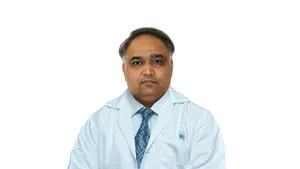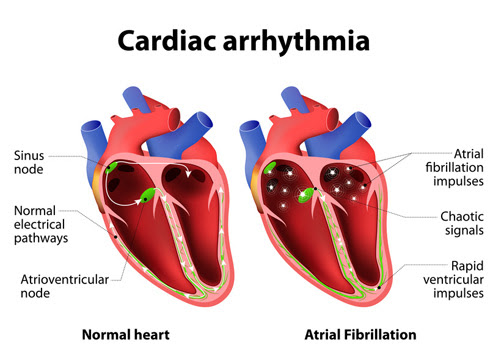What is Arrhythmia Treatment?
Arrhythmia treatment involves a range of interventions aimed at managing irregular heart rhythms. An arrhythmia occurs when the heart beats too fast, too slow, or irregularly due to a disruption in the heart's electrical system.
Treatment options depend on the type and severity of arrhythmia and can include:
- Medications: Drugs to control heart rate, rhythm, and prevent blood clots.
- Catheter Ablation: A minimally invasive procedure to destroy heart tissue causing irregular rhythms.
- Cardioversion: Electric shocks to restore a normal heart rhythm.
- Implantable Devices: Pacemakers and Implantable Cardioverter Defibrillators (ICDs) to regulate or restore normal rhythm.
- Surgical Procedures: For severe cases, options like the Maze procedure may be used.
Arrhythmia treatment focuses on restoring normal heart rhythm, alleviating symptoms, and preventing complications such as stroke, heart failure, or sudden cardiac arrest.
Types of Arrhythmias
There are different types of arrhythmias, each requiring a tailored approach to treatment:
- Atrial Fibrillation (AFib): The most common arrhythmia, where the atria (upper heart chambers) beat irregularly and out of sync with the ventricles (lower chambers). AFib increases the risk of stroke and heart failure.
- Bradycardia: A slow heart rate, often requiring a pacemaker to regulate the rhythm.
- Tachycardia: A fast heart rate that can be life-threatening if not treated.
- Ventricular Tachycardia and Fibrillation: Serious conditions affecting the lower chambers of the heart, often requiring ICD implantation or emergency treatment.
- Supraventricular Tachycardia (SVT): An abnormally fast heart rhythm originating above the ventricles, typically managed with medications or catheter ablation.
Symptoms of Arrhythmias
Arrhythmias can manifest in different ways depending on the type and severity of the condition. Common symptoms include:
- Palpitations or fluttering in the chest
- Shortness of breath
- Dizziness or lightheadedness
- Chest pain or discomfort
- Fatigue or weakness
- Fainting or near-fainting episodes
Some arrhythmias may not produce noticeable symptoms but can still pose significant health risks, such as stroke or heart failure. Regular cardiac check-ups and diagnostic tests are essential for early detection and management.
Types of Arrhythmia Treatment Procedures
- Medications:
- Antiarrhythmic drugs are used to regulate the heart's rhythm or control its rate.
- Blood thinners like warfarin or newer anticoagulants reduce the risk of stroke in patients with atrial fibrillation.
- Catheter Ablation:
- A minimally invasive procedure that involves inserting thin catheters into the heart to target and destroy the abnormal tissues causing arrhythmia.
- Typically used for conditions like AFib or SVT that do not respond to medications.
- Cardioversion:
- A procedure where controlled electric shocks are delivered to reset the heart's rhythm to normal.
- Often used in patients with atrial fibrillation.
- Implantable Devices:
- Pacemakers: Small devices implanted under the skin to regulate slow heart rhythms.
- ICDs (Implantable Cardioverter Defibrillators): Devices that deliver electric shocks to correct life-threatening arrhythmias like ventricular fibrillation.
- Maze Procedure:
- A surgical intervention in which small cuts or burns are made in the heart tissue to block abnormal electrical signals.
- Often performed during other cardiac surgeries like valve repair.
- Lifestyle Changes and Rehabilitation:
- Smoking cessation, regular exercise, stress management, and a heart-healthy diet can improve outcomes and prevent recurrence of arrhythmias.
Benefits of Arrhythmia Treatment
- Restoration of Normal Heart Rhythm: Patients experience relief from symptoms like palpitations and fatigue.
- Reduced Stroke Risk: Effective management of atrial fibrillation significantly lowers the risk of stroke.
- Improved Quality of Life: Patients can return to normal activities without limitations caused by arrhythmia symptoms.
- Enhanced Heart Function: By correcting irregular rhythms, the heart pumps blood more efficiently, reducing the risk of complications.
- Prevention of Cardiac Events: Timely treatment helps prevent life-threatening conditions like heart failure or sudden cardiac arrest.
Recovery After Arrhythmia Treatment
Recovery from arrhythmia treatment varies depending on the type of procedure performed:
- Hospital Stay:
- Catheter ablation: Patients are typically discharged within 24 hours.
- Device implantation (pacemaker or ICD): Hospital stays may last 1-2 days.
- Post-Treatment Monitoring:
- Regular follow-ups are essential to monitor heart rhythm, ensure device functionality, and adjust medications if needed.
- Lifestyle Adjustments:
- Patients are advised to maintain a balanced diet, exercise regularly, and avoid smoking or excessive alcohol consumption.
- Full Recovery:
- Most patients resume normal activities within 4-6 weeks, with significant improvements in their symptoms and overall well-being.
Factors Affecting the Cost of Arrhythmia Treatment
The total cost of arrhythmia treatment depends on several factors, including:
- Type of Treatment:
- Catheter ablation and surgical procedures are costlier than medication management.
- Hospital Reputation:
- Renowned hospitals with advanced technology and facilities may have higher charges.
- Surgeon Expertise:
- Experienced cardiologists and electrophysiologists may charge premium fees for their services.
- Diagnostic Tests:
- Pre-treatment tests like ECG, echocardiograms, and Holter monitoring add to the overall cost.
- Device Costs:
- Pacemakers and ICDs are expensive but essential for managing certain arrhythmias.
Why Choose India for Arrhythmia Treatment?
India is a leading destination for arrhythmia treatment due to its combination of affordability and high-quality care. Benefits include:
- World-Class Hospitals: Equipped with state-of-the-art technology and internationally accredited for cardiac care.
- Highly Skilled Specialists: Indian cardiologists and electrophysiologists are globally recognized for their expertise.
- Affordable Costs: Arrhythmia treatment in India is 60-80% cheaper than in the US or Europe.
- Comprehensive Medical Tourism Packages: Covering treatment, accommodation, and travel, these packages make it convenient for international patients.
- Short Waiting Times: Patients can access timely treatment without long waiting periods.
Why Choose Healtour Solutions for Arrhythmia Treatment?
At Healtour Solutions, we make it easy for international patients to access the best arrhythmia treatments in India:
- Personalized Consultation: We connect you with leading hospitals and specialists based on your condition.
- Affordable Packages: Our packages include treatment, transportation, and accommodation at competitive prices.
- End-to-End Support: From visa assistance to post-treatment care, we ensure a seamless experience.
- Expert Guidance: Our team is available 24/7 to address your concerns and provide ongoing support.
FAQs About Arrhythmia Treatment
- What is arrhythmia?
Arrhythmia refers to an irregular heartbeat caused by a disruption in the heart's electrical signals.
- What are the common symptoms of arrhythmia?
Symptoms include palpitations, dizziness, chest pain, fatigue, and fainting.
- Is arrhythmia a life-threatening condition?
Some arrhythmias, like atrial fibrillation, increase the risk of stroke, while others, like ventricular fibrillation, can be fatal if untreated.
- How is arrhythmia diagnosed?
Diagnosis involves tests like ECG, Holter monitoring, echocardiograms, and stress tests.
- What are the treatment options for arrhythmias?
Treatments include medications, catheter ablation, cardioversion, pacemakers, and Maze procedures.
- How long does recovery take after arrhythmia treatment?
Recovery typically takes 4-6 weeks, depending on the procedure.
- What is the cost of arrhythmia treatment in India?
Costs range from $2,500 to $10,000 USD, depending on the treatment type.
- Are the treatments safe?
Yes, arrhythmia treatments like catheter ablation and pacemaker implantation are safe and effective.
- Can lifestyle changes help manage arrhythmias?
Yes, a heart-healthy diet, regular exercise, and stress management can reduce the severity of arrhythmias.
- 10. Why choose India for arrhythmia treatment?
India offers affordable treatment, expert cardiologists, state-of-the-art facilities, and comprehensive care packages.




